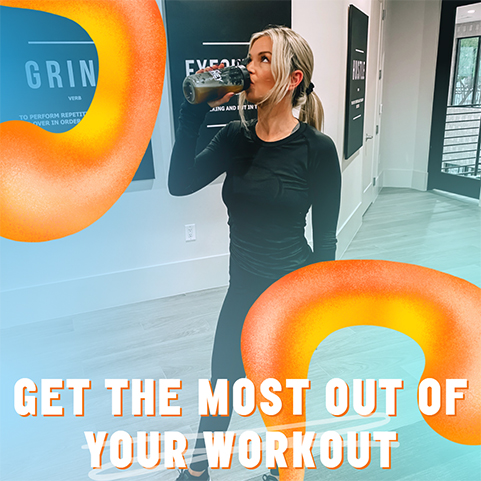Protein2o’s Guide to Getting the Most out of Your Workout
Enhance your energy levels, optimize recovery and get the most out of your workout with your nutrition.
3-4 Hours Before Your Workout: Water + Balanced Meal
Did you know that a 2% level in dehydration can cause a 10% decrease in performance? Make sure to hydrate and eat a well-balanced meal with carbohydrates, lean protein, and healthy fats to give you sustained energy.
Examples include:
- Avocado toast with a protein water
- Salad made with chicken, avocado, fruit and a vinaigrette dressing
- Salmon, sweet potato fries and green beans
1-2 Hours Before Your Workout: Water + Balanced Snack
Stay hydrated and consume a balanced snack with carbs, protein and/or fat.
Examples include:
- Apple and peanut butter
- Cheese and crackers
- Peanut butter toast
30 Minutes- 1 Hour Before Your Workout: Water + Carbs
Within 30 minutes to an hour of your workout, consume a carbohydrate rich snack and hydrate again. Opt for fast-acting carbs to give you a quick energy boost.
Examples include:
- Banana
- Rice cakes
- Dry cereal
Foods to Avoid Pre-Workout
Consuming the following foods pre-workout may cause some bloating and not be so friendly on your stomach. Don’t worry, you can go right back to eating them as soon as your workout is over.
Examples of foods that may cause bloating or discomfort:
- Cruciferous veggies
- Too much fiber
- Sugar alcohols
- Carbonated beverages
During Your Workout: Water + Electrolytes + Carbs
While you are exercising, remember to hydrate. Aim for 4-6 oz. of water for every 20 minutes of exercise and replenish electrolytes as needed. If you are working out for 90+ minutes and/or feel symptoms of low blood sugar, eat a small amount of carbohydrates for a little energy boost. We recommend a sports drink or energy chew during exercise to give you enough energy to maximize your workout without weighing you down.
Examples include:
- Sport drink
- Energy chew
- Orange
Within 45 Minutes After Your Workout: Water + Electrolytes + Carbs + Protein
If you are sweating and/or working out in the heat or humidity, it is essential to replenish your electrolytes. Electrolytes are important for maintaining hydration and the proper function of our muscles. Electrolytes can be found naturally in food, sports drinks (such as Protein2o) and supplements. Protein2o gives you the easiest way to replenish your electrolytes and get a healthy serving of protein in five different flavors.
After exercise, it is important to hydrate again, eat carbs, and consume protein to help aid in muscle recovery. Consuming carbs after your workout helps to spare protein loss and replenish the carbs lost during exercise. Now you can enjoy those fibrous complex carbs again!
Examples include:
- Oatmeal
- Sweet potato
- Berries
Getting protein in your system within 45 minutes post-workout will help repair muscle tears faster, speeding up recovery. Your body optimally absorbs about 30g of protein at once, so try to consume around 25-30g of protein post workout.
Examples of protein include:
- Protein water
- Chicken
- Greek yogurt
If you are hungry, opt for a balanced meal, with lean protein, complex carbs, healthy fats and veggies to keep you fuller for longer and regulate blood sugars. If you prefer to get your post-workout protein from supplements, there are plenty of options to choose from. Two main forms of protein powders are protein concentrates and isolates. Protein concentrates typically provide 60-80% protein with the rest being made up of fats and carbs. Protein isolates go through an additional filtering process removing fats and carbs, concentrating the protein powder to contain about 90-95% protein. Protein2o’s new powder stick packs use protein isolates to provide the highest quality protein powder.
There are also several different types of protein powders to choose from, including whey, pea, casein, hemp and more. Choose a protein powder based on your intolerances, allergies, and goals. One of the most popular protein supplements is whey. According to studies, whey has been found to be the best for muscle growth. However, pea protein is a great alternative for those who can’t tolerate whey.



